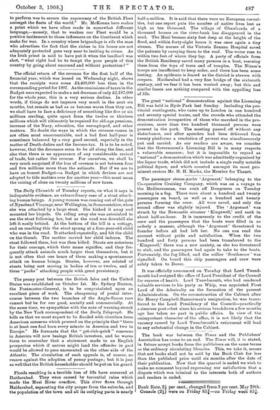Mr. McKenna at Pontypool, also on Thursday; declared that the
supremacy of the British Navy was the surest guarantee of European peace. That is, of course, a truism ; but less obvious, though equally sound, was Mr. hicKenna's next remark :—" If ever a weak and inferior Navy gave rival Powers the prospect of a break-up of the British Empire—we should fail to read and understand aright the Most obvious leesons of history if we did not recognise that— the hopes and ambitions of other Powers would inevitably be stimulated to a degree which would be most nnfortenabe for the peace of the world. The task which the Admiralty had to perform was to secure the supremacy of .the British Fleet amongst the fleets of the world." Mr. McKenna here makes a point which we have often made in somewhat different larignage,—namely, that to weaken our Fleet would be a positive incitement to those influences on the Continent which make for war. In a country where brigandage is rife the man who advertises the fact that the riches in his house are not adequately protected goes very near to inciting to crime. As the Irish priest is said to have put it when the landlord was shot, "what right had be to tempt the poor people of this country by going about unarmed and without protection ? "

























































 Previous page
Previous page